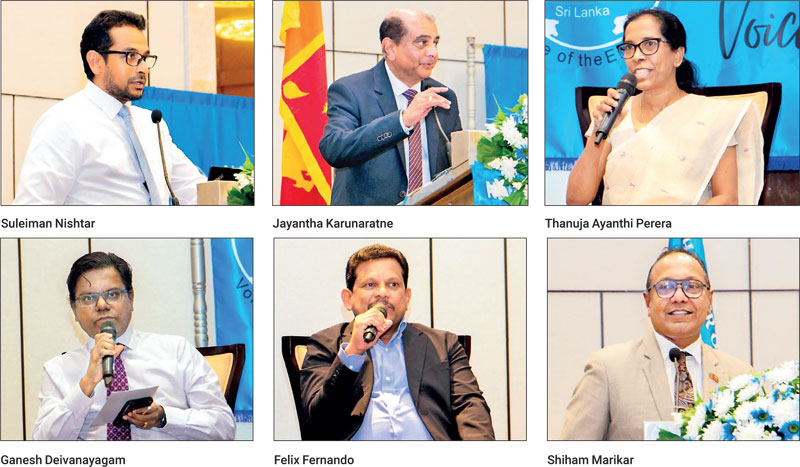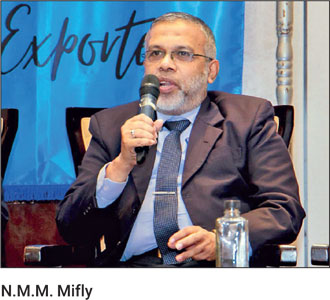Saturday Feb 21, 2026
Saturday Feb 21, 2026
Monday, 17 July 2023 03:06 - - {{hitsCtrl.values.hits}}

 The announcement by the Government to abolish the Simplified Value Added Tax (SVAT) has created concerns among the exporter community and the members of the National Chamber of Exporters of Sri Lanka (NCE) have been raising the issue with the Chamber Council, highlighting the negative impact it could result on the exporters.
The announcement by the Government to abolish the Simplified Value Added Tax (SVAT) has created concerns among the exporter community and the members of the National Chamber of Exporters of Sri Lanka (NCE) have been raising the issue with the Chamber Council, highlighting the negative impact it could result on the exporters.
The concerns such as the negative impact of cash-flow, refund mechanism and processes were highlighted by the members. To discuss these issues the NCE organised a seminar followed by a panel discussion under the subject on 7 July at Hotel Galadari Main Ballroom with an attendance of more than 240 participants.
Ernst & Young TAX Partner Suleiman Nishtar made a presentation to create awareness of the subject matter which was then followed by the panel discussion including panellists such as: 1. Inland Revenue Department Tax Policy, Legislation, Rulings and International Affairs Deputy Commissioner N. M. M. Mifly; Ministry of Finance Tax Policy Advisor Thanuja Ayanthi Perera; Tea Exporters Association of Sri Lanka Chairman Ganesh Deivanayagam; Joint Apparel Association Forum Sri Lanka (JAAFSL) Deputy Chairman Felix A. Fernando; Nations Trust Bank PLC Commercial Banking Executive Vice President Arosha Liyanaarachchi; and Imperial Teas Group Ltd. Chairman and Managing Director and NCE President Jayantha Karunaratne
On 5 June, the Cabinet approved a decision to abolish the SVAT scheme with effect from 1 January 2024, as a reform under the Extended Fund Facility (EFF) by the International Monetary Fund (IMF), SVAT was introduced in April 2011 to address the fraud and corruption that arose due to delays in VAT refunds to manufacturers supplying to exporters, providers of specified services to exporters and many other taxpayers. The decision to abolish the SVAT scheme could have drastic adverse repercussions on taxpayers as well as the tax administration.
Speaking at the panel discussion, Ministry of Finance Tax Policy Advisor Thanuja Ayanthi Perera, said that the removal of SVAT is in the drafting stage and that there is no VAT mechanism in any other country without refunds. “Refund is part and parcel of the VAT mechanism. Currently, we are in a situation where we need to have more revenue mobilise,” she said.
She said that the reasons for introducing SVAT (in 2011) were to minimise the refund issues/delays in refunds and also to address the corruption vulnerabilities.
Perera also said that the authorities are working on a mechanism to make sure that the exporters are protected via a refunding mechanism in place and protect the revenue by preventing the leakages.
It was discussed that the IRD needs to issue credit vouchers to Customs for VAT amount payable at the point of import under the Temporary Import for Export Processing (TIEP) scheme. A prolonged delay in processing credit vouchers causes very much inconvenience to clearing import cargo on time.
Obviously, this resulted in delays in the production process and meeting customer timelines.
Further, exporters were required to increase bank guarantees from time to time and spend a lot of valuable administrative time. SVAT was introduced to deal with these issues and reversing back the decision would be going back and facing these issues again.
Perera assured at the panel discussion, that if there is no proper refunding mechanism in place the removal of SVAT may not take place during 2024 January.
The Moderator of the panel, NCE Secretary General Shiham Marikar, said that chamber members have raised concerns about the Inefficiencies in processing the VAT refunds in a timely manner resulting in the building up of massive VAT refunds leading to working capital of the taxpayers being held up at the tax office, causing extremely adverse impact on the cash flows of the taxpayers.
In 2021, the total amount of VAT refunds from the manufacturing and import sector was about Rs. 471 million, with the manufacturing sector having Rs. 456 million as refunds.
Prior to the implementation of the SVAT system, exporters, who had refunds from the IRD suffered due to the inefficiencies of the tax office to process refunds in a timely manner. Some refunds to exporters dragged up to about 18 months. Due to massive refund build-ups in the past, the room opened for fraud and corruption in relation to VAT refunds as well.
The SVAT mechanism, which was a home-grown solution, was introduced to suspend VAT Payable by such persons, so that the liquidity position was unaffected and to remove the refunds with the use of vouchers issued by the IRD.
Following its implementation, SVAT was utilised by the exporters for the purchase of local inputs, which are subsequently converted into finished products for export.
Tea Exporters Association Chairman Ganesh Deivanayagam said: “If there is a proper refunding mechanism the exporters will not raise concerns about abolishing the SVAT scheme. “No other country has suspended TAX, we do have created a need to place that system.”
He said that exporters do not want the SVAT to be removed – because of fear of the refund mechanism and the bad experience they have faced in the past, 90% of exporters will be uncomfortable with the refund system and mechanism.
The abolition of SVAT will force the exporters to import their raw materials rather than purchasing them locally and going through the less efficient VAT refund system which will affect the cash flow, resulting in increased imports impacting the exporters and country›s Balance of Trade.
Joint Apparel Association Forum Sri Lanka Vice President Felix Fernando shared his thoughts on the speed of the refunds /having a proper refund system.
He said that the IMF officials and their report is focused on increasing government revenue with different proposals. He stated that in other countries when VAT is raised by 1% the revenue will increase by 4-5% but in Sri Lanka, it ranges about 2% because there are leakages in the Tax base.
He further stated that the taxation regulations to Increase personal tax and SVAT removal will lead to difficulties, especially in the SME sector. If there is a guarantee from the Ministry of Finance and IMF officials on the refund mechanism, proper audit criteria for taxation – transparency and also avoiding harassment from tax officers then the exporters may not have so many concerns.
NCE Chairman and Imperial Teas Managing Director Jayantha Karunarathna said that the main concern of the exporters is the refund mechanism. He stated that the Exporters will face a lot of problems with cash flow being negatively impacted while the exporters are presently facing other challenges in terms of increase of tax from 15% to 30%, increase in energy costs, buyers demanding more discounts etc.